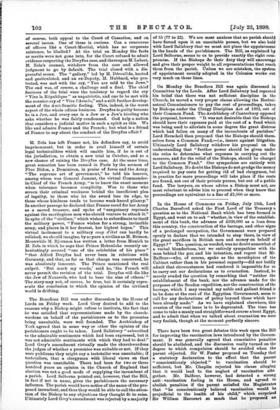M. Zola has left France not, his defenders say, to
avoid imprisonment, but in order to avail himself of certain legal technicalities which will enable him, if he is out of the jurisdiction, to obtain a new trial in October, and so a new chance of raising the Dreyfus case. At the same time, great sensation has been caused in Paris by the sermon of Pere Didon, a Dominican, in praise of force and the Army. "The supreme art of government," he told his hearers, among whom was General Jamont, the virtual Commander- in-Chief of the French Army, "is to know the exact moment when tolerance becomes complicity. Woe to those who screen their criminal weakness behind the insufficient plea of legality, to those who let the sword lose its edge, to those whose kindness tends to become weak-kneed pliancy." In another passage he declared that France cared for her Army as a sacred treasure, and spoke of "sanguinary reprisals against the sacrilegious men who should venture to attack it." In spite of the " civilism," which wishes to subordinate to itself the military power, "France wishes for a strong, invincible army, and places in it her dearest, her highest hopes." This virtual incitement to a military coup d'etat can hardly be relished, we should imagine, by so pure a civilian as M. Brisson. Meanwhile M. Bjiirnson has written a letter from Munich to M. Zola in which he says that Prince Hohenlohe recently un- hesitatingly assured "one of the celebrities of his place" "that Alfred Dreyfus had never been in relations with Germany, and that, as far as that charge was concerned, he was absolutely innocent. The Prince mentioned the real culprit. 'But mark my words,' said he, the French will never permit the revision of the trial. Dreyfus will die like the Jew of Nazareth, who had to bear the sins of others.'" The story may not, of course, be true, but it certainly repre- sents the conclusion to which the opinion of the civilised world is drifting.


































 Previous page
Previous page